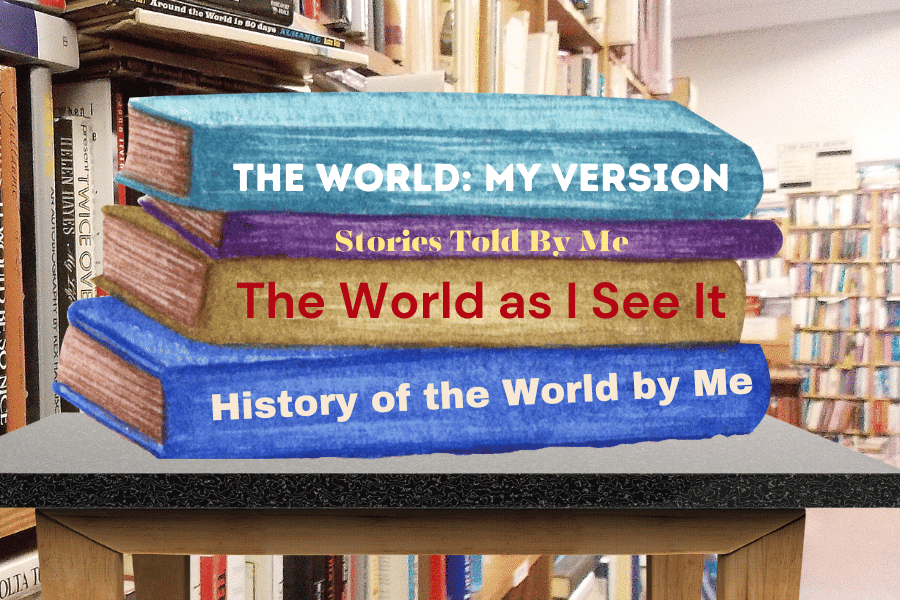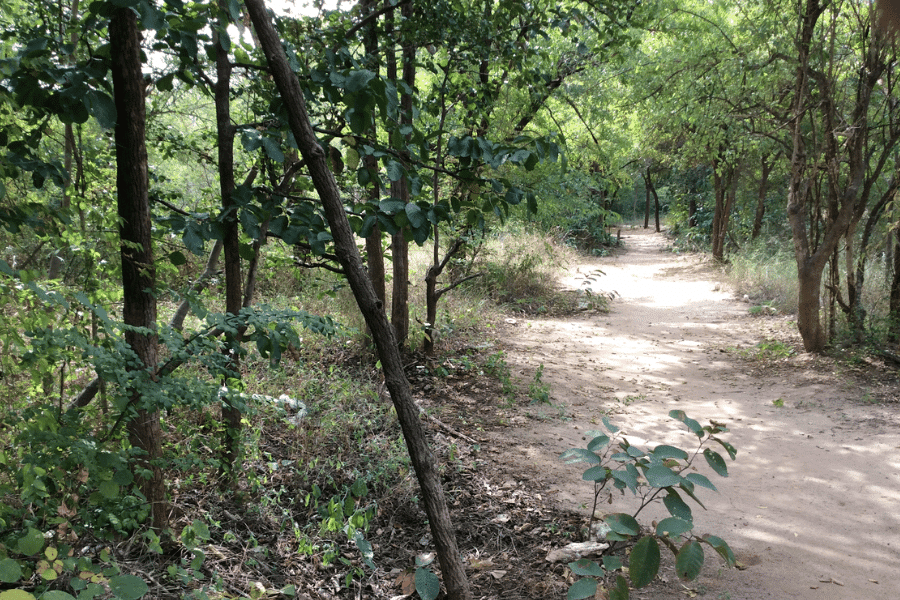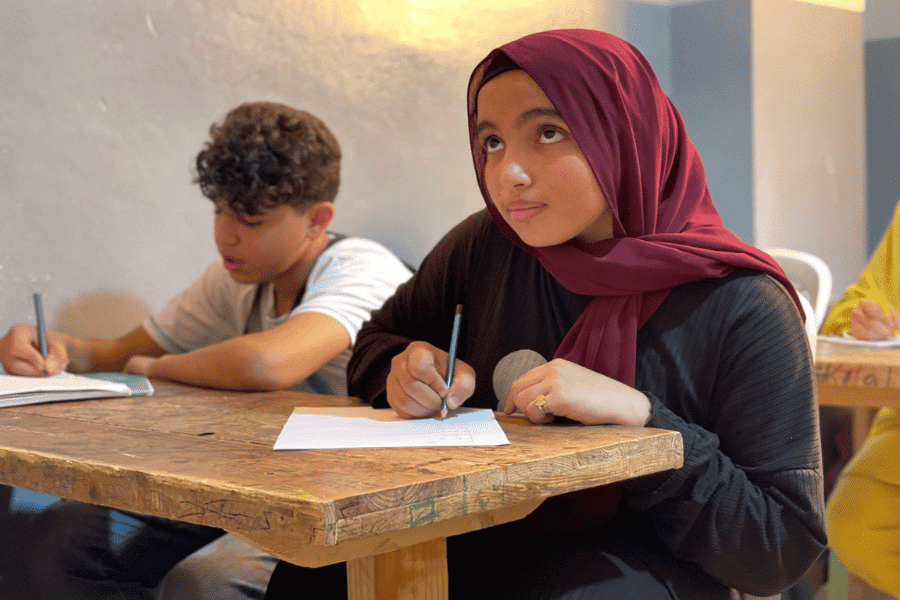
by Maria Krasinski | 12 Jul 2024 | Art, Journalism, News Decoder Tips
A photo might be worth a thousand words. But an artistic drawing can tell a story in a different, and powerful way. Replica of “The Thinker” by Auguste Rodin at the Varenne metro station in Paris. (Illustration by Maria Krasinski) In News Decoder’s...

by Paul Spencer Sochaczewski | 13 Jun 2024 | Culture
We may not recognize them, but we all undertake quests. They can be grand and cinematic, or quiet and reflective. They all change our lives. Hanuman, the flying monkey god. The quest in search of Hanuman’s mountain took Paul Spencer Sochaczewski some 30 years to...

by Marcy Burstiner | 23 May 2024 | Culture, Educators' Catalog, History, Media Literacy
Historians dig up stories that document our past the way archeologists sift through relics. The more they learn the more we realize how much we don’t know. A stack of books in a bookstore that tell only one version of the world. (Illustration by News Decoder)...
Historians dig up stories that document our past the way archeologists sift through relics. The more they learn the more we realize how much we don’t know. News Decoder’s Editorial News Director Marcy Burstiner examines history and the versions of history that we’re told.
Exercise: Explore the idea of stories being told from different perspectives and of certain histories being silenced or underrepresented. Choose a current topic and have students look at it from different perspectives. What kinds of histories might be forged through telling the story in different ways?

by Yawen Xu | 13 May 2024 | China, Culture, History
“China chic” has millions celebrating China’s glorious past. The number of people traveling to historic sites and tourist attractions is skyrocketing. A woman, Zhu Zhu, wears hairpin flowers on a visit to Quanzhou, China 2 April 2024. Photo provided...

by Paul Spencer Sochaczewski | 10 May 2024 | Asia, Culture, Educators' Catalog, Environment, Religion
What’s a more powerful conservation incentive — a government jail or the wrath of a nature spirit? A shady path in a sacred forest in Myanmar. (Credit: Paul Spencer Sochaczewski) This article was produced exclusively for News Decoder’s global news service. It is...
What’s a more powerful conservation incentive — a government jail or the wrath of a nature spirit? There are many ways to preserve wildlife. Correspondent Paul Spencer Sochaczewski ventures into Myanmar’s sacred forests to unearth the secret of conservation.
Exercise: Start a discussion on ways governments and communities can protect local flora, fauna and areas of natural interest. Read the article and discuss the suggested questions. Students should then undertake research to identify other examples of local folklore and community spiritual and religious beliefs affecting environmental conservation positively. Hint: Look to countries with a strong history of folklore and explore stories with links to the natural environment.

by Lance Roller II | 29 Apr 2024 | Art, Media Literacy, Science
Ailments affect all kinds of people. But images doctors see in their textbooks and research journals don’t often reflect that. AI just makes it worse. Two medical illustrations by artist Ni-ka Ford. On the left is a depiction of botox injections. On the right is...

by Katharine Lake Berz | 8 Apr 2024 | Culture, Education, Educators' Catalog, Human Rights, Middle East, Syria
Desperate to give daughters a safe life, some refugees marry them off early. One organization in Lebanon is showing girls that there is an alternative. Batoul, age 13, in an Alsama classroom in Lebanon. Batoul came to Alsama two years ago illiterate because her...
Girls face barriers to education due to poverty, cultural norms and practices, traditional gender roles, societal pressure and gender inequality. Katharine Lake Berz looks at how education and gender equality play a crucial role in redressing the balance and keeping girls worldwide from early marriage.
Exercise: Read the article. Use the ‘Questions to Consider’ below it as a starting point for discussion. Find out more about the importance of girls’ education and think about why it should be a priority. For further reading and research, use the following information on girls’ education: Girls Not Brides, World Bank. Discuss why this issue should be a priority and how it relates to SDG 4 and SDG 5. You could screen this ‘School is just the start’ TED Talk by Angelina Murimirwa (8min) and discuss the key points in groups.

by Enzo Cazzaniga | 18 Mar 2024 | Contest winners, Culture, Europe, Personal Reflections, Realgymnasium Rämibühl Zürich, Student Posts, Youth Voices
Millions of people move from one place to another. When it isn’t just the city that changes but the language and culture, it can be difficult to feel at home. A doormat says “Home Sweet Home.” (Credit: Andy Dean Photography) This article, by high...

by Liv Egli | 12 Mar 2024 | Contest winners, Culture, Realgymnasium Rämibühl Zürich, Student Posts, Youth Voices
Psychologists call it cognitive dissonance when you disconnect beef from the killing of a cow. But some think you need to know the animal you eat. Cows look on as someone is about to eat a fat, juicy hamburger. (Photo illustration by News Decoder) This article, by...

by Joshua Glazer | 11 Mar 2024 | Culture, History, Judaism, Religion, School Year Abroad, Student Posts, United States, Youth Voices
Like their parents before them, thousands of U.S. teens head to camp this summer. But for many, this R&R combines relaxation with religion. Two generations of kids at Jewish summer camp. Joshua Glazer, shown right, and his mother, when she was about the same age....










